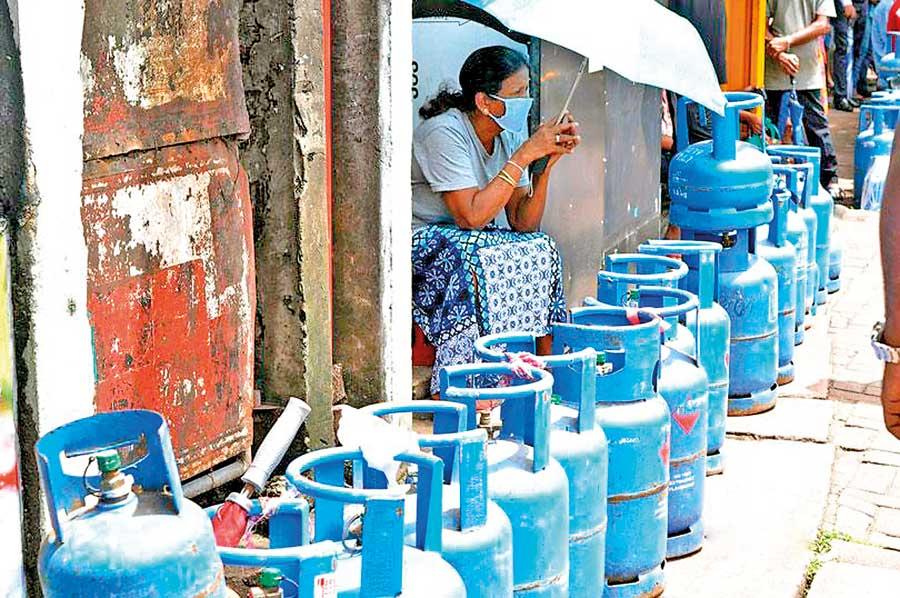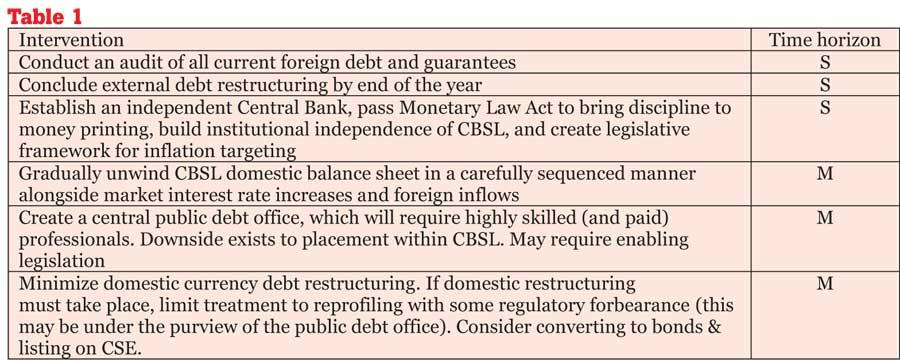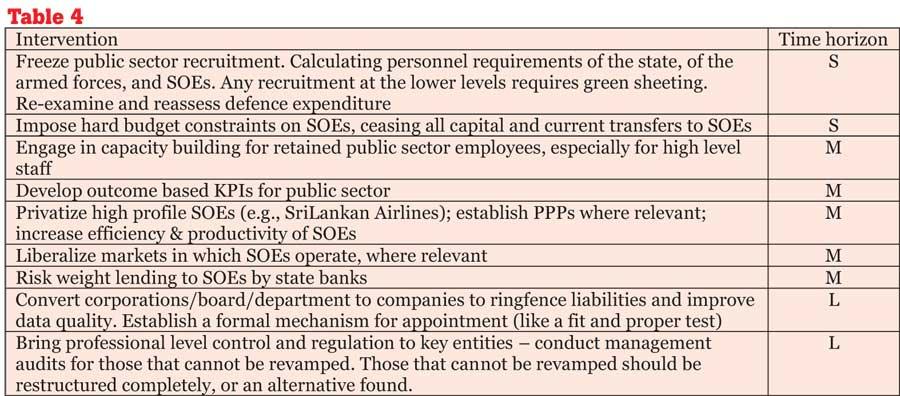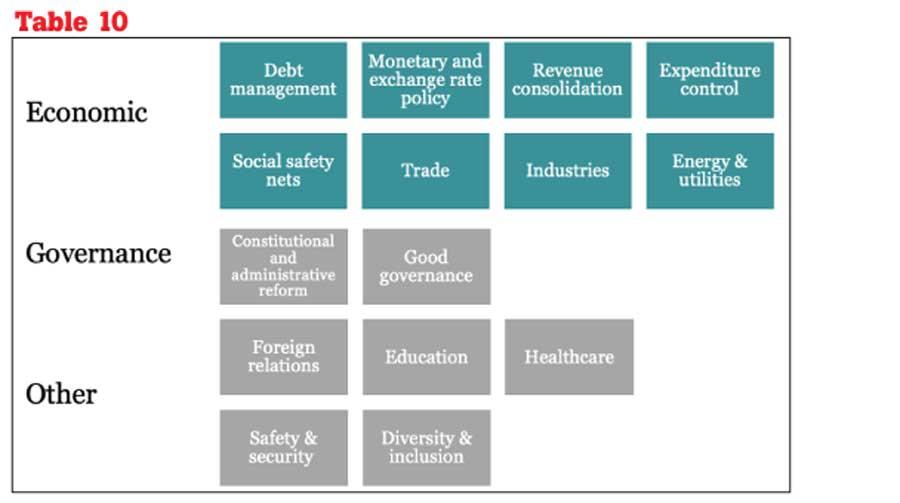13 Jun 2022 - {{hitsCtrl.values.hits}}
Compiled by the National Movement for Social Justice

People waiting for their turn to purchase a gas cylinder
We are in the throes of an unprecedented crisis. No useful comparisons may be drawn from the 2001- 02 period of negative economic growth. The only analogue may be from 90 years ago, when per capita GDP collapsed from USD 80 to 33 in a few years as part of the Sri Lankan manifestation of the Great Depression.
Sri Lanka has the highest income inequality in South Asia (between China and the US in international comparisons) and provided little compensation for the harms caused by the pandemic and lockdowns. Our citizens in the lower deciles are unable to withstand more shocks. It will not be possible to get out of this crisis without any pain. But the pain can be minimized, especially for the most vulnerable, by a well thought out recovery programmeme.
We should not abandon the commitments to fiscal discipline on the first possible occasion, as was the case in the past. We must be steadfast in our commitment to these reforms because they are our decisions and because this is the only way recurrences can be avoided.
Political actors may be unwilling to accept working within the framework of an IMF programmeme because of the fear of being made responsible for the difficult, but necessary, reforms. That is why it is necessary to commit to a common minimum programmeme which provides a meaningful role to all participating parties and is anchored in Parliament’s Constitutional responsibility for the control of finances.
We present below a Common Minimum Program for Economic Recovery developed over a period of 10 months, drawing on the expertise and views of many individuals and organizations. Immediately implementable actions in the following areas that address the underlying causes of the crisis and are necessary to manage the crisis are presented:
1. Macroeconomic stability
2. Revenue consolidation
3. Primary expenditure control
4. Public sector and SOE management
5. Social safety net
6. Energy and utilities
7. Trade and industry
8. Specialized legislation critical to recovery

How the document was developed
By mid-2021, the National Movement for Social Justice recognized the necessity of developing a national consensus on measures to get out of the crisis and to avoid recurrences. In keeping with its practice of drawing on expertise to develop policy positions, a series of “kathikawa” webinars were organized starting in July 2021. Subsequently, a draft of a common minimum programme in all three languages was published in February 2022 for further discussion in the media and otherwise.
Around the same time, various organizations, including political parties, associations and think tanks, published recommendations. In the past few months many were published making it difficult to ensure comprehensive coverage. Economic recommendations that could be implemented within a short time frame were selected from an ideologically broad set of documents and were analyzed (annex 1). Significant agreement was found on topics such as the need for control of government expenditure and the establishment of an efficient and well-targeted social safety net. On issues such as trade and state assets, there were divergences. The results of the comparative analysis were presented to a group of economists (annex 2) who suggested changes in substance and prioritization. The revised recommendations were presented to a panel of business leaders (annex 3) for validation. Changes were made throughout. The final document differs significantly from the base document.
Proposals
The proposals are organized under eight headings that were identified in the course of the analysis and validation. With each of the specific recommendations, the economists were asked to identify the relevant time frame for action: short-term (within 2022); medium-term (by end of 2023); and longerterm (completion after 2023). The time frames are provided as starting points for discussion only.
Given that the economic team is in place, the selection of advisors has been completed, and discussions with the IMF are ongoing, the proposals below look beyond these ongoing activities that are seen as being in good hands. Many of the base documents had been prepared before the above activities commenced. The recommendations that had been implemented by the time of the finalization of this document have been excluded.
It is recommended that priority be given to the Monetary Law Act (which exists in draft form), which will ensure the independence of the Central Bank, which is seen as essential for macro-economic stabilization. Attention is also focused on ensuring that data on public debt are accurate at all times and that a professional approach is adopted for the management of different forms of debt and guarantees. The proposed Public Debt Office should be an elite organization staffed by highly qualified and experienced professionals. It was felt that providing adequate compensation packages for such professionals would be a challenge unless the Office was located within the Central Bank. However, concerns were expressed about whether the placement of the Public Debt Office within the Central Bank would detract from the central objectives of the Bank.

Revenue consolidation
It is almost certain that the entering into an IMF programme will require a commitment to a time-bound achievement of a primary surplus. This will require the raising of revenue above the current levels. Irrespective of the IMF, this is a laudable objective. Action to restore the tax regime that existed prior to December 2019 has already been initiated. Therefore, the proposals below look beyond the restoration of the 2019 revenue measures.
It is necessary to increase non-tax revenues by increasing the fees charged for services and revenues from state assets. However, it would be good if attention is paid at the same time to reducing the costs of collecting the revenue and improving the services provided. For example, paperwork can be simplified, and the frequency of collection can be adjusted. There is likely to be less resistance if service quality is improved when fees are increased. In some instances, the collected fees go into funds under the control of the responsible agencies. It is important that any funds more than what is required for operations be remitted to the Consolidated Fund.
There are many negatives to the practice of handing out tax exemptions to investors. Exemptions under the Strategic Development Projects (SDP) Act No. 14 of 2008, should be discontinued. Even those who currently enjoy SDP status should be subject to a minimum alternative tax, proposed as 15 percent. Sri Lanka should join the Base Erosion and Profit Shifting (BEPS) Framework. A progressive corporate tax regime, without sharp discontinuities, is recommended.
Customs reforms including changes to customs officers’ reward schemes are recommended. The complex duty structures should be replaced with a three-band scheme and para tariffs should be phased out.
The significant weaknesses in Sri Lanka’s revenue administration should be addressed. Though challenging, a unified revenue administration that would bring together inland revenue, customs and excise is an urgent necessity.
Primary expenditure control
The need to ensure that the provisions of the Fiscal Management (Responsibility) Act, No. 3 of 2002, are scrupulously followed was highlighted. Given the disappointing track record since enactment, opinion was split on the relative importance of strengthening the Act versus ensuring a culture of compliance. In the end, there was support for the amendments on the basis that compliance may be looked after by the engaged oversight provided by newly energized citizens.
Concern about large debt-financed projects lacking in feasibility is reflected in the proposal to mandate projects that are in line with the National Physical Plan and have been assessed as meeting all stated criteria. The entity responsible for the Physical Plan should be situated in an appropriate Ministry and must be adequately funded and empowered to ensure compliance.

Public sector and SOE management
A freeze on public-sector recruitment is strongly recommended, with all vacancies being filled with those already in state service (green sheeting). Defence expenditures are still the highest a decade after the end of the war and most of it is in the form of recurrent expenditures, with inadequate provision being made for force modernization. A serious effort is recommended to realign and reduce defence expenditures.
The actual personnel requirements of the state, of the armed forces, and SOEs must be calculated, and surplus personnel redeployed. The state must make major investments to upgrade the capacity of personnel in the public service, starting with the leadership layer. To assure productive performance, they must be provided with the necessary facilities. This should not be limited to tangible things such as computers, but must include proper performance reviews, the formulation of customized training plans and the provision of necessary resources for training, etc. Professor Mick Moore, a long-time observer of the Sri Lankan state, has documented the decline of the resources spent on making state employees more productive at the same time as the numbers of employees have been going up.
The privatization of at least one high-profile SOE such as SriLankan Airlines, as already announced, will communicate seriousness of purpose both to debt holders and to the various interest groups. A task force should be established to review all state corporations and stateowned companies and prioritize those to be divested, reorganized as PPPs, or subjected to management reforms. Markets where SOEs operate as monopolies or as protected suppliers should be liberalized.
It is proposed that all SOEs be converted into companies which will ringfence assets and liabilities, improve adherence to accounting standards, and allow for the floating of shares in the CSE under appropriate conditions. It is also proposed that procedures like the “fit and proper test” used for bank boards be established to ensure that persons appointed to the boards of SOEs can perform their duties.
Hard budget constraints should be imposed on SOEs engaged in commercial activities. State banks should be instructed to apply normal risk assessment criteria when lending to SOEs.
Social safety net
The Welfare Benefits Board Act became law in 2002, but it is yet to be implemented. It is recommended that the board be activated, the databases completed, and a social safety net be 5 implemented immediately. Because of the similarities of the present situation with disaster and because surveys show that 77 percent of households that receive regular benefits from the government have access to bank accounts, it is recommended that cash transfers to bank accounts of mobile money accounts be used, with improvements to targeting being made over time.
Energy and utilities
Refined and unrefined petroleum products account for around 15 percent of the country’s total merchandise import bill (it may be even higher in 2022). Formula-based pricing for imported fuel, which was recommended in multiple documents, has been implemented, though the actual formula and the periodicity remain opaque. It is recommended that these elements be addressed.
Because fuel is a key input for the production of electricity, which in turn is a significant input for the production of piped water, it will be necessary to extend formula-based pricing to these utility services as well. It appears that distributors of cooking gas are adjusting retail prices to reflect the cost of imports and the value of the rupee. It is recommended that all petroleum products, including cooking gas, be brought under utility regulation through a sector specific law, and price and quality regulation be entrusted to the Public Utilities Commission.
Because over 60 percent of fuel imported into the country is spent on transportation, it will not be possible to address the current account deficit and the volatility caused by world markets unless concerted action is taken to shift more passengers to efficient modes of transport. This will require a shift to a public transport first policy and the removal of various forms of subsidies currently in place for private transport. The investments required for this shift may have to be obtained from external sources.
Loadshedding has many negative implications for the economy. To ensure regular power supplies for industry and for consumers, it is necessary to increase the amount of electricity generated from the abundant potential that exists for wind and solar. To take power from these intermittent sources and to remove the cause of periodic country-wide failures, additional investments are necessary to upgrade the transmission grid. The transmission network is currently operated under a separate license, but not as a ring-fenced and independently operating entity. Making it an independently operating entity will be necessary for the required investments to be made and procurements completed in a timely manner and for services such as wheeling to be introduced.
After the divestment of SriLankan Airlines has been completed, it will be necessary to attract airlines, especially low-cost carriers, to Sri Lankan airports. Mattala has been fully liberalized. It will be necessary to consider liberalization at least up to fifth freedom level at Colombo. The rights to provide ground handling services should not be bundled with the airline as part of the divestment. Separate and focused efforts should be made to improve the management of the airport including the lowering of currently non-competitive ground handling service fees and non-discriminatory treatment of all airlines using the airport.

Trade and industry
The committees established under the National Export Strategy of 2018 should be used to identify difficulties experienced by exporters. With the relevant state officials present at these meetings, quick action can be taken to remove the barriers to exports. It is likely that barriers include permits for imports of critical inputs and bank-related difficulties will feature large. The permit raj that has been established in the past few years has to be disassembled if exports are to be promoted. The necessity of imports for exports will have to be impressed.
The crisis and the accompanying failure of basic infrastructure services has brought industrial zones back into discussion. Unlike in the 1980s, it would be useful to allow privately managed industrial zones, where the operators will be responsible both for the investments and the recruitment of tenants.
Specialized legislation critical to recovery
It is expected that a large number of enterprises will fail and that hundreds of thousands if not more employees will be thrown out of work as a result of the crisis. Extant legislation is not capable of effectively responding to these unprecedented events.
Unless new bankruptcy laws that are applicable to all enterprises are enacted quickly, the recovery will take long. In the same way, unless a more realistic mechanism than Termination of Employment of Workman Act (TEWA) for handling employees who lose their jobs as a result of the crisis is set in place, enterprises will not be able to survive.
For further information: Rohan Samarajiva +94 77 735 2361
Policy proposal comparison
Eight policy proposals representing a broad range of ideological views formed the base of this document.
The proposals covered on 15 broad thematic areas. We focused on 8 with most economic relevance (subsequently edited following consultation with economists and business leaders – see annexes 2 and 3).
Participants at consultation with economists Senior economists
Dr.Sarath Rajapathirana, Prof.Sirimal Abeyrathne , Murtaza Jafferjee
Young Economists
Rehana Thowfeek, Chayu Damsinghe, Umesh Moramudali, Naqiya Shiraz,
K.D Vimanga, Anushka Wijesinha,
Gayani Hurulle
Other
Hon Karu Jayasuriya, Prof.Rohan Samarajiva, Dhananath Fernando
Participants at consultation with business leaders
Krishan Balendra, Rohan Pallewatta, Sanjiva Weerawarana, Hanif Yusoof, Mangala Boyagoda , Samantha Ranatunga, Deva Rodrigo, R. Manivannan, Sujan Wijewardene
Other
Hon. Karu Jayasuriya, Prof. Rohan Samarajiva, Gayani Hurulle ,Dhananath Fernando, Harindra Dassanayake
26 Dec 2024 27 minute ago
26 Dec 2024 3 hours ago
26 Dec 2024 3 hours ago
26 Dec 2024 5 hours ago
26 Dec 2024 6 hours ago